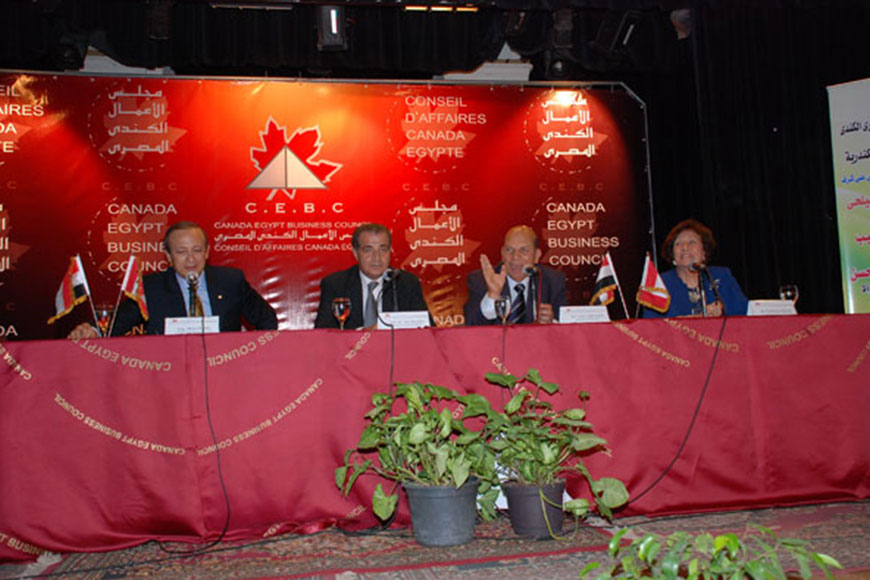
Date
Speaker(s)
Designation
Description
The Canada Egypt Business Council, CEBC and the National Council for Women co-hosted a special event and a panel discussion in Alexandria at the Artistic Creativity Center, incorporating various eminent businesswomen, key government officials, as well as a number of distinguished guests, discussing the topic “The Growing Role of Women in the Society.
The one-day event debated on the remarkable improvements observed in the empowerment of women in all arenas and their key role in the development of the Egyptian economy.
Mr. Moatz Raslan, Chairman, Canada Egypt Business Council, CEBC delivered his opening remarks by outlining the significant role played by women in advancing societies, elaborating that notable traits have been acquired by Egyptian women as a result of their increased access to education and employment. “Today, young generations of women have boundless aspirations and contest with their male peers in all areas of education and at all levels. There is a significant increase in the number of women occupying high managerial posts, and other decision-making positions during the past ten years, such as the posts of university presidents, judges, cabinet ministers, deputy ministers and chairs of city councils”, said Mr. Raslan.
He went on to explain that the contribution of women to the economy is an important indicator of society’s progress and a propelling force in economic and social development. He added that in view of the experience of other countries, we could not forget that the United Kingdom ever-greatest Prime Minister since the industrial revolution was Mrs. Margaret Thatcher, besides, Mrs. Indira Gandhi, one of the best-known women of the 20th century and a great former Prime Minister of India.
Mr. Raslan also affirmed that since the government of Egypt (GOE) started adopting economic reform strategies, high developmental impacts on all political and economic fronts were conquered. “These developments are the fruits of successful proceedings taken by the State to provide the appropriate environment for promoting the woman’s role in the public life. Moreover, we cannot ignore the government role in adopting policies leading to boosting the woman status economically and socially as well as encouraging her to participate in various political domains as well as allocating a number of places for women in the Egyptian Parliament.
Conversely, he added that it was noted that although Egyptian women have played a pivotal part in boosting economic and social development, yet their role still faces major challenges, having some suggestions claiming that women’s role should merely be at home taking care of their families regardless of their active participation in the society.
Finally, Mr. Raslan stressed on the fact that comprehensive development can never be materialized in our country without the positive participation of the woman, as she is considered half of the society and the more the relationship between the two halves is of mutual interest, the more prosperity and progress will be conquered. “Both parties are in the same boat and the lack of cooperation and any marginalization for women’s role in the public, economic, and business fronts will lead to a loss for all stakeholders and in this case only the future generations will pay the price”, concluded Mr. Raslan.
Mr. Raslan then introduced and welcomed H.E. Ambassador Ferry de Kerckhove, Canada’s Ambassador to Egypt who started his speech by explaining the significance of promoting the equal participation of women besides men. He delved into the subject of gender empowerment and equality stating that it fundamentally relies on cooperation between all institutions and bodies of the state as well as the civil society. “The policies of woman empowerment should be based on confirming the principle of cooperation and participation between the government and the civil society in implementing and assessing these policies”, noted the Canadian Ambassador.
H.E. Ambassador de Kerckove finally discussed his perspective on the role of the State, explaining that it should aim for protecting and endorsing women’s rights that is founded in the ‘Global Gender Gap Report’, issued by the World Economic Forum (WEF). He added that equality between women and men should be subjected to changes in order to undercut those pressures and stigmas that prevent women from utilizing both their natural entrepreneurial capacities, and the potential instilled in them through increased investment in education, concluded the Canadian Ambassador
General Adel Labib, Governor of Alexandria, then took the podium highlighting the critical responsibility of the civil society as a key partner in endorsing total support to all efforts made by the State for the advancement of women’s role in our society, and enhancing their capacities for effective participation in all political, economic, social, and cultural spheres. “I believe that the advancement of women is one of the main pillars for Society’s progress and advancement”, added General Labib.
He further emphasized the role of the National Council of Women (NCW) in supporting women’s economic and social status and ensuring their effective participation in all areas of growth that were difficult to reach in the past. The Alexandria Governor finally noted that, great efforts were exerted by the Council to politically empower women, where a center for political qualification was established, aiming at training woman to share in political activities.
General Labib was followed by Dr. Farkhonda Hassan, Secretary General, The National Council for Women who explicated the Council’s value as a national scheme to empower women and enhance their status. She went on to outline that the serious efforts undertaken over the years, have contributed to the achievements Egyptian women have realized and have supported the successes that confirmed women’s competence and worth in all areas and in all positions of responsibility. “This was done through urging continuous development of the legislative framework and the laws that support women’s rights. The Council has always taken the initiative to create new tribunes and movements that would provide women with wider opportunities and more horizons for progress by building alliances with our development partners in the Government, the private sector, and civil society as well bridging cooperation and join efforts with women’s institutions and organizations at the regional and international levels.”, added Dr. Farkhonda.
The Secretary General went on to clarify that despite all the achievements, Egyptian women have conquered, yet they still do not fulfill all their dreams and aspirations. She added that women in Egypt and many other developing countries continue to struggle to promote their access to decision-making and political participation in a manner, which permits them to exercise real leadership with all that entails in terms of responsibility, and to participate in the outlining of policies to achieve change in the desired direction.
Moreover, she noted that the Council is totally engaged with line ministries, in developing national plans and establishing a standing mechanism to ensure gender mainstreaming. This is in addition to developing gender-sensitive indicators to monitor the benefits that women draw from the implementation of these plans.
Concluding Dr. Farkhonda stressed on the importance of underpinning the sense of integrity and creditability among civil, private, and public sector that can further enhance Egyptian development attempts. “The Council will continue to adopt a methodology of integration and participation as a mechanism to transform the position of women in our social structure from one of recipient of aid and support to one of effectiveness and leadership. This will be achieved by focusing on the quality of education, training and awareness-raising programs to create new leaders who believe in voluntary action and participate in public affairs through the various organizations of civil society, whether associations, syndicates or political parties”, Dr. Farkhonda said.
The final keynote speaker of the event, H.E. Dr. Aly Moselhy, Egypt’s Minister of Social Solidarity started his speech by delving into the impact of various projects implemented by the ministry aiming at raising the woman’s social and cultural level such as the rural woman projects and the rural outreach training centers.
He went on to outline that the policies of woman empowerment are based on confirming the principle of cooperation and participation between the government and the civil society in laying down, implementing and assessing these policies. He added that the role played by women was not only their right but also an inevitable duty.
The minister also affirmed the importance of spreading cultural awareness with an outlook that can develop public vision as well as enrich dialogue and disseminate public knowledge. “The role of the civil society should be to reinforce and underscore the achievement of social justice or what is known as ‘just and balanced development’. International experiences and expertise point to the fact that women are usually supportive to the integration of social justice in development plans and policies and are most concerned with the needs of various social groups”, added Dr. Moselhy.
Moreover, the Minister noted that media as well could be considered as a basic tool in forming social and political thought through interaction within the community and reflecting the different ideas and opinions. In fact, it can shape and influence public awareness and conquer the needed balance between the two halves of our society. “This integral cooperation in line with the constructive participation of the civil society can lead to the advancement of our country, which can never occur without the active contribution of the lively half of our community, women”, concluded the Minister.
A question and answer session followed the minister’s speech covering major issues including women elections in the Egyptian Parliament, “Democracy versus National Duty”, spread of political education in schools as well as women rights in rural areas.
























